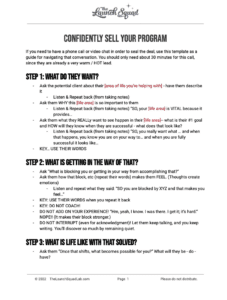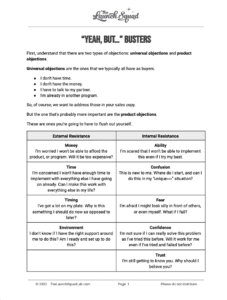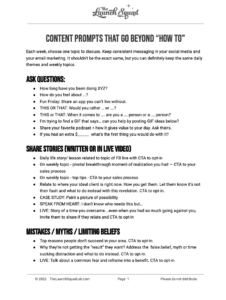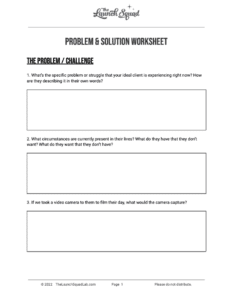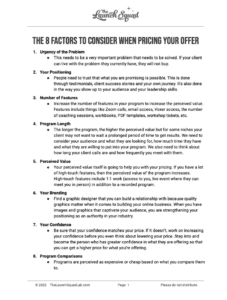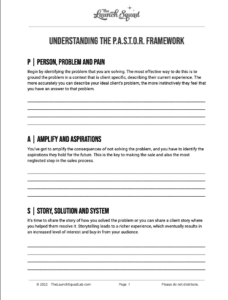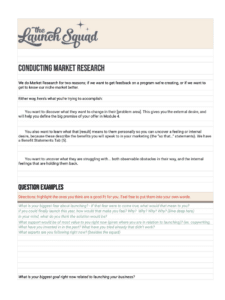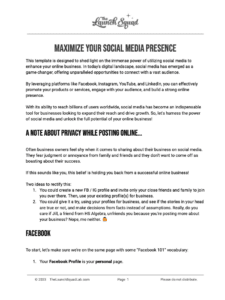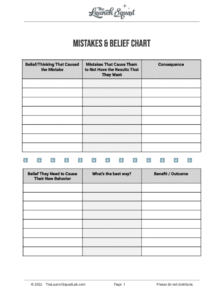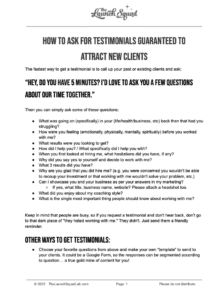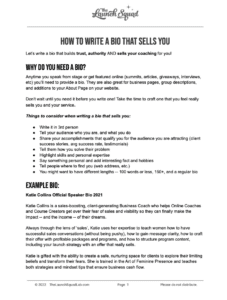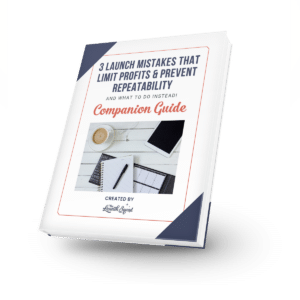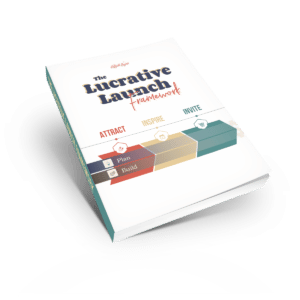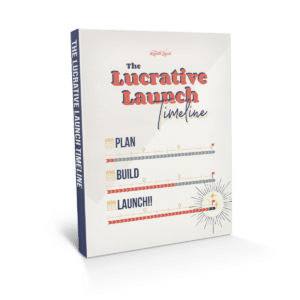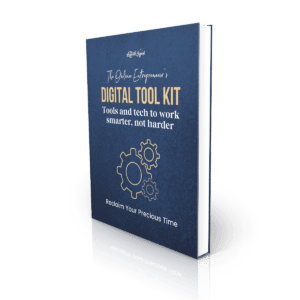She’s been helping businesses achieve accelerated and sustainable results and increased profitability for more than two decades.
She is the founder of the Lean Out Method, creator of the Lean Business Scaling System, and host of the Lean Out Your Business Podcast.
Join us in welcoming to the podcast stage, Crista Grasso!
[00:00:00] Jeffrey: Welcome to the Light In Your Launch podcast. Today we're talking about scaling your business simply and sustainably no matter where you are on your journey. So stay tuned.
[00:00:56] Jeffrey: Welcome back to this show. I'm Jeffrey Samano.
[00:00:59] Katie: And I'm Katie Collins.
[00:01:01] Jeffrey: And today we're talking about how to simplify success, get off the hustle hamster wheel, and run a lean business specifically how to significantly scale beyond your competitors skyrocket profits and reduce your overhead. This is how the big dogs are doing it.
So why can't we, Katie, who are we talking with?
[00:01:24] Katie: Our guest today is the go-to strategic planning and systems expert for online businesses. When they want to scale known as the business optimizer, she has the ability to quickly cut through the noise and provide clarity on the core things that will make the biggest impact to scale a business simply and sustainably.
She's been helping businesses achieve accelerated and sustainable results and increased profitability for more than two decades. She's the founder of the Lean Out Method, creator of the Lean Business Scaling System, and host of the Lean Out Your Business podcast. When she's not dishing out the merits of lean, strategic planning, or simple, sustainable scaling, you can find her drinking espresso.
Rocking out with Brett Michaels, or spending time with her dogs and a great book. She's an avid traveler, always embarking on new adventures. Please welcome to the podcast Stage Krista Grass.
[00:02:21] Jeffrey: Welcome.
[00:02:22] Crista: Thank you so much for having me. I'm so excited to be here.
[00:02:25] Katie: We are excited to be here with you,
[00:02:28] Jeffrey: Is it? Is it Bad? I don't know who Brett Michaels is. Is he popular
[00:02:32] Crista: don't say that. T Michaels lead singer of poison nothing. What a good time.
[00:02:41] Jeffrey: All right. I do know Poison. I just never knew Brett Michaels
[00:02:46] Crista: Yes. I, I might have been a child of the eighties and nineties, just saying
[00:02:50] Jeffrey: Yeah. You know, I grew up on Kiss and Poison and Def Leppard, Led Zeppelin. Oh my God. I guess we're in the same age bracket. I.
[00:02:58] Crista: Mm-hmm. . Yep.
[00:03:00] Katie: That's so funny. I avoided all that loud music and I listened to like Simon and Garfunkel Crosby Stills in Nash, Steve Miller Band, The Eagles
[00:03:11] Crista: all.
[00:03:11] Katie: just, I'll just hide over here in the corner.
[00:03:14] Jeffrey: Yeah. No judgment, but that's lame. No, I'm, I'm joking. I'm joking. uh,
[00:03:23] Katie: start just by asking to, um, for you to explain, what do you mean by lean business?
[00:03:30] Crista: Yeah, absolutely. Great question. So Lean really grew up in the manufacturing space, and then it became really popular in software development. I'm trying to bring lean to all businesses, including online businesses, and it's really just about. Providing as much value as possible for your clients and eliminating as much waste as possible in your business.
So you always wanna maximize value and minimize waste. And if you think about most small businesses and most scaling businesses, there is an abundance of waste in the business, usually in the form of unnecessary complexity. So trying to lean out your business is really just looking at how can you get rid of all of that unnecessary complexity.
And scale in a more simple and sustainable way.
[00:04:19] Jeffrey: Hmm. I love that you're talking my
[00:04:22] Katie: me a little bit of, Yeah, I was gonna say, it reminds me a little bit of what Jeffrey calls, you know, uh, software bloat, right? Like, how many different pieces of software do you have that overlap? Do the same thing you're paying for, you know, it three times, right? , so,
[00:04:39] Crista: Completely, and that's just like a software example, which is so common. I'm sure you see that in every business that you work with, because I see that often too. Where else in our business do we do that? Do we do things that we don't even realize? Multiple people on our team are doing the same things, or we're doing something the long, hard, complicated way that could have been done in three steps instead of 10?
So yeah, so many examples of that.
[00:05:03] Jeffrey: Oh my God. Just yesterday. . Just
[00:05:05] Katie: I was just thinking that I'll, I'll, I'll tell the scenario. So I wanted to email about 50 people and I was picturing, you know, I made a template and then I was gonna paste it into a new email and then update their name and update, you know, the information I needed and then hit send 50 times. And he was like, before he even knew I was gonna do that, he was like, Oh, do you want me to help you just use gmas and you.
You know I what Now? You explain it from your I'm like, I.
[00:05:38] Jeffrey: put the relevant data in a spreadsheet. Create merge fields, put those into a gmas, and then hit send all go in one. Just let it all go
[00:05:48] Katie: So it took us 15 minutes instead of at least two hours
[00:05:56] Crista: I love that example.
[00:05:57] Katie: it. Yeah. Yeah. So that's awesome. And I mean, it, it is, um, It really helps to work with other people or have people who just know how to tell you how to make that easier, right? Like, I don't know what I don't know. I can do something and I know how to solve it my way, but that doesn't mean it's the best way or the right way.
So it's important to have other people, , tell you what you don't know.
[00:06:30] Crista: Yeah, and I feel like the outside in perspective is always so interesting because you get used to doing something a particular way in your business. Sometimes you just don't even stop to think is there a different way, because it's just what you do. Whereas somebody else from the outside could come in and say, You know that if you just click here, you could do that.
And half the time, right.
[00:06:48] Jeffrey: Yeah. You know, that, that I think is a, is a, is a really interesting point. And I didn't realize this until I started working with a team, but I've, I've been the kind of person that would constantly, Is there a better way, Can I do this? Can I work in a spreadsheet and then take that spreadsheet and do something with it?
You know, can I do this? Can I do this? What are the settings like? I always joke that if I get a new software or a new app or something, the first place I'd go is the settings right? How can I customize this? What can this software do for me? Right? And I'd realize not everybody thinks that way. You know, and, and I don't know what my point is, but , I just, I, I, I think there's, there's room for that and maybe there's, um, maybe that's something that people do need to develop, like the kind of like, well, to, to qu to at least pose the question.
I wonder if there's a faster way to do this. You.
[00:07:51] Crista: Yeah, I, One of the things that I do, we do this internally within our team, but I encourage my clients to do it too, is anytime you commit to a plan, So if you're creating your strategic plan for the next 90 days, if you're committing to your plan for the day, whatever it ends up being, you ask yourself, is there a simpler way to get the same or better results?
And sometimes it's just taking that short pause to consider it instead of just going through the routine of doing what you always do to realize. There actually is a better way to do this, or there actually is a simpler way to approach this.
[00:08:23] Jeffrey: Mm-hmm. Yeah. Some of it, uh, some of it, some things that come up for me are like, um, the rut or the crux we get in as entrepreneurs where we are so used to doing something, and then when we try to hand it off, we're like, gosh, you know, it's gonna take, uh, just as long to tell somebody else how to do it as to it is gonna do it myself.
You know? And, and we get stuck in that we get stuck in that and, you know, how do we, how do we get out of that? How, what, how do we get.
[00:09:02] Crista: Yeah. One of the things that I help people with a lot is hiring, and there's a lot of, or hiring the right team or delegating effectively to the team they have, and there's so much resistance around it because some of the biggest objections I get is it's just quicker if I do it myself and nobody's gonna be able to do it as good as me.
And a, those are two assumptions that are not always correct, but the reality is sometimes you're absolutely right. They're not gonna be able to do it as good as you, nor are they gonna be able to do it as quick as you. However, if you keep doing absolutely everything yourself, you're not gonna be able to get to the things that are gonna be able to really scale your business.
To the innovations that are gonna help you, you know, create something different and do something that you truly love and do something bigger. And it's when you hold on to all the things, it makes it really hard to really, truly work on your business and do what it's gonna take for that big vision that you have.
And I think that's the hard thing is. Sometimes you need to actually try to train somebody or systematize something to allow somebody else to be successful, and you can be pleasantly surprised. But there are times where, yeah, it's gonna take 'em longer cuz they don't have the 20 years of experience that you have or they're not gonna do it quite as well.
But it's gonna get done. It's gonna get done with good quality and you don't have to do it and look at it. So you have the space for something that's much more important.
[00:10:21] Jeffrey: Yeah, and I think that's the key right there. That's the key, is like once you do hand it off and you explain it once, now you've freed up that portion of that segment of time that you would normally, you know, need to repeat that task or whatever in that compounds over time.
[00:10:44] Katie: Yeah. That's been a big growth for me since, um, working with Jeffrey in the Launch squad because I had very, I was very much a solo entrepreneur in Katie Collins coaching, you know, and, and it worked for me. I, I never wanted to work with hundreds of clients at a time. Like I didn't like that model. I really liked the one to one.
Teaching. You know, it was something, as a teacher, I wish I had more time for one to one. So I think when I became a coach, I was like, I love this. Being able to, um, you know, work in that way and not have hundreds of clients. Um, and so coming into the Lump Squad, it was just a, um, A big lesson for me. I mean, I had a VA in my other business, but just to understand how to write SOPs, how to, um, let our, you know, if they're, um, living in another country, how to let them know how to do a task, like the best way.
And so maybe written email isn't as good as doing a video and sharing the screen and being like, Here's exactly what I want you to do. Um, and, and so just learning. How can I give my directions better? And again, that comes from my teaching too. They used to say, you know, if, if half your class fails your test, that's on the teacher.
Right? Like, your test wasn't written well or you didn't teach them what they needed. Right. And so that's where I always come from. When if, if we have a staff that didn't do something correctly, I'm like, I must've forgotten to put that part in the sop . Right. So just constantly refining that. Um, and so, you know, just having the patience, like understanding it's not gonna be perfect the first time, but having the patience and the kindness and the compassion to come, you know, go back and forth and get it right together.
Um,
[00:12:30] Crista: Yeah, it's, And you said something so interesting there about how it takes a little bit for somebody to get it right and you have to learn somebody's learning style, right? It's, especially if you're working with somebody where English might not be their first language, maybe written isn't the best possible way.
Maybe it's better to demonstrate and show, which I really, really like because. Everybody has different learning styles, and we tend to lead with what we do and what works for us, and we forget sometimes that other people need things in different ways.
[00:13:01] Katie: Yeah. Yeah.
[00:13:03] Jeffrey: I pulled this quote from your website and I'd love to hear your thoughts on it or for you to expand on this, but you said, you know, what you say no to is just as important as what you say yes to. What does that mean?
[00:13:16] Crista: Yeah. I think in business, especially when you think about scaling, What do we think of when we think of scale? Most people think of more, more, more, more, more, more. And I think that that's actually not what scaling is. Scaling is not constant addition. But even if you're not even thinking about the term scale and you're just thinking about your business as a whole, what do we do?
We add, we are coming up with a new quarter and we're like, Oh, I'm so excited for this new project. I'm gonna do this new thing. Add, add, add. We're constantly saying, To new things, and we need to subtract. We need to say no to things to create the space for the things that we wanna do, because otherwise, as entrepreneurs, we inadvertently put ourselves on the hustle hamster wheel because we're overextending ourselves.
We're saying yes to all the things. We end up having to work more to keep up, or we end up super disappointed when we've overcommitted and we can't get done. Everything that we said we were gonna do, which hopefully is internal and not client facing because that's even worse. But I think that you have to get really comfortable with saying no.
And saying no can be hard for us in general, but sometimes saying no isn't just saying no to things that are the wrong fit. Sometimes you have to say no to things that are a great fit because you have to create the space for something else and it can be really hard to do. But I think that's what.
Really differentiates those who are able to be successful and to scale in a way that's sustainable instead of just piling more on top of themselves or on top of their.
[00:14:53] Jeffrey: how does that really play out? Like, could you give us some examples on that?
[00:14:58] Crista: Yeah, there's a few different things. So the Lean Out method itself has four overarching, uh, pillars. The very first one is context. And I think in order to know what to say no to in your business or in order to know what to say yes to in your business, you have to know where you're going. So the context, we always start everything with context where you want that clarity of.
You wanna know where you're taking things next in the business, because that's what's gonna let you say, is this thing that I'm even considering, or this thing that I'm still doing, is this directionally correct with where I see the company going with what's coming next for us? And when you look at your vision, I think you wanna look across three facets.
There's obviously the business itself, but there's also your role in the business and how you want to be positioned in the company. Do you elevate to more of a thought leader over time as opposed to the one who works day to day with the clients? How does your role shift and grow? And when you look at that future vision, but the piece I see most people not include that I think is really critical is the client component of.
What are your clients of tomorrow? Like, how do their needs shift and grow and how are you in the business gonna be able to support that? And I think that all of that feeds your business model, and that's all part of that context pillar. And what I see really, really often is, People are doing so many things and they're not working on the right things at the right time.
They're doing something because they committed to it. So they feel like they have to, Somebody told them it was a great idea and they've gotta be on TikTok, so they're off trying to figure how to dance on camera, right? It's like they hear all these things and they feel like they've, the, the should, all these like legacy things that they previously committed to.
If they really take the time to look at their vision and where they're going and what's next and why those changes are important to them, there's a lot of stuff that they're investing time, money, and energy into that are not the right fit. They're either not the right fit right now, or they need to be starting to make a plan to phase them out because there's something else that's needed to actually achieve the vision that they have.
And so that to me is what it looks like, and that's one of the very first places I start with my clients. Where do you wanna go and what can we lean out or get rid of , um, or reimagine so that you actually have the space to get there?
[00:17:25] Jeffrey: I
[00:17:26] Katie: And do, do people typically lean out of things that they're like, I don't even like that. Or is it like, what's bringing you the most results? Right. Is it emotion or is it, um, you know, data that helps you understand what to get rid of? Or both
[00:17:42] Crista: Yes, . Um, so I, I'm a big believer in a blend of both qualitative and quantitative data. So the fourth pillar of the lean out method is kaizen. It's all about making small, continuous improvements and changes for the better. And to me that's, you want a way of regular retrospection in your business. You wanna be reflecting and looking at what's working.
But I think that you can't purely go on emotion, um, because our emotions can kind of fool us and it's very subjective based on how we're feeling on that day. Or we can be really reactive to things sometimes. Um, and it also can't be purely data oriented. And I'll give you an example. One of my clients, um, we started working together.
We made some changes in her business, and she had a three x. From one 90 day period to the next. If you purely looked at her numbers, you would've said, Amazing. Keep doing what you're doing. This is excellent. But we looked at beyond the numbers. How did she feel about what she was doing? What was working?
Was she feeling? What was draining her? What was fueling her? We looked at all of these things and it turns out she was working way too much. She was spending time on things that really weren't the right things to be spending time on. They were not fueling her whatsoever. They were draining her. And so by looking at both the quantitative and qualitative data, we said, Cool.
We got some amazing results. Here's what's working. Awesome. Let's figure out how we could double down on this piece of it and repeat it. Let's look at what's not working so well and what's not supporting you and what's not feeling fulfilling, and how can we change these things up so that you can sustain those results, but get rid of all the things that aren't working.
And so we completely restructured her calendar and a lot of her drain was that people had just kind of open access to her calendar. So people were, clients were scheduling calls whenever there was an open spot. People who were, her referral partners were putting time on her calendar. Whenever there was an open spot.
She was jumping from one thing to the other without much break in between. So her only time to work on her business was on the weekends or the evenings. Um, so we just completely restructured her calendar. Put protected spaces for things in place, um, and made it where she had protected time to work on her business that wasn't nights and weekends.
And she went from all of that chaos down to a four day work week and continued to grow her business exponentially the next quarter. So it was a combination of both though that really gave that, that.
[00:20:11] Jeffrey: And what, what would you say to. Those entrepreneurs that are feeling complete, overwhelmed because they have to. They have to be the service provider. They have to be the marketer, They have to be the visionary, they have to be the process engineer. They have to be the systems operation manager. They have, Right.
You've got. The copywriter, the, the, the graphics creator and, and maybe they have a team, but they, they're still, their, their mind and their kind of daily actions is still on all of these different things. And really what it comes down to is that, you know, that balance between working on the business and working in the business, you know, what parts of the business are you working in and what parts of the business are you working on?
And like all of that overwhelm. How do you cut that down? What do you prioritize? You know, do you, do you have to be on social media all the time and do you have to master that platform while you're building your course and while you're building your services? Like what, where, what would you say to that?
What do you cut? What do you focus on?
[00:21:17] Crista: Yeah, I mean, it's such a common scenario, sadly, like it's such a common scenario and I think we have all been there at one time or another. Um, and so I think there is no cookie cutter way to scale a business. There is no one and only one way to go for, you know, whoever you know, the listeners for your particular audience.
Maybe social media is your really, all of your clients are gonna come from social media, so you've gotta create the space for it, and you really wanna try to optimize what you're doing with it, because that. Best source for potential clients for somebody else. Maybe social media has very little bearing on lead generation or conversions.
In which case, can you redirect those efforts somewhere else or use social media as more of a repurposing platform as opposed to something that you're pouring a whole lot of? Intention and focus into. So I think this comes down to business model. It comes down to that clarity of your vision and where you wanna go across those three facets.
And then it comes down to really solid strategic planning to look at, We have endless options of how we're gonna get here, which are the ones that make the most sense for us to focus on right now based on, you know, what our goals. Based on what our revenue targets are, based on the skills and the expertise that we have available with the resources that we have.
So maybe you have a team and that team has certain expertise and you don't have the funds to invest in somebody else or in upskilling the team today. Then maybe today you choose something that your team can do. If you have the resources available to hire somebody else with an expertise or to upskill your existing team, then great.
Maybe you have the ability to focus on something different. So I think you just have to really strategically look at all those facets. But to get to the like, what if you're still kind of having your fingers and everything and you have a team? I think you have to get really, really comfortable with letting other people fully own things, and that typically comes down to having really solid systems and setting really clear expectations around what success looks like.
Sometimes I will see people document systems and they focus purely on the how to. They've got their screenshots and their step one and their step two, and they've got everything documented and then they. Why when they give it to somebody, they're not getting the results in exactly the way that they want.
And oftentimes it's the contextual stuff that ultimately is going to let you step away and trust somebody else to do it. So I think you need to take the time to be really clear about what success looks like to communicate why you expect something a particular way, because it might not make sense to the person doing it.
So they might. Skip over it. , Right? And so I think that's the key is you do have to trust in your team. And part of that is learning to be a better visionary leader to set that vision and to let your team do, but you have to give them the tools to be successful, which includes training systems and trust.
So you have to be able to do that to set them up for.
[00:24:26] Katie: Yep. I love that. I, I definitely focus on the why a lot with our team. Like, well, we're not gonna do that and here's the reasoning cuz I want them to learn and grow with us, you know, and to understand stuff that they may not. You know, I think people have to realize when you have a virtual assistant, you know, they can be a virtual assistant for a dentist office setting appointments, and they can be a virtual assistant for an online coaching business, right?
So very different requirements and understanding and you know, I think a lot of us make assumptions that all virtual assistants serve in the industry. That we're in and we forget, um, , that's not always the case. So I love that point of really teaching the why and explaining. Just to help them make better decisions or understand things, um, as they move forward.
So I like that.
[00:25:16] Jeffrey: What would you recommend for first hires, generalists or specialists?
[00:25:22] Crista: So I believe in T-shaped tires. So
[00:25:26] Jeffrey: Okay. Okay.
[00:25:28] Crista: there's, So if you think about, um, if you're familiar with the concept, I, I teach this all the time to people when they're hiring. I T E I is a deep specialist, so if you think about an eye, it's a line that goes down. So it's a deep specialty, and I think that you're a deep specialist in a small business, especially when you've got a really small business and you're in your first couple hires.
Those are typically freelancers or agencies or people that you're gonna contract out to for either a particular project or somebody maybe that you're gonna put on retainer. Like if you wanna start doing. Book ads. If you don't have that expertise, you probably wanna hire somebody who lives and breathes Facebook so that you get the best results from your investment.
Um, and so I think that that's where the eye comes in is you're not typically hiring an eye, but you're consulting with an eye for a specific purpose and objective. Um, your T-shaped person is, if you think about a t, they've got the deep specialty in one area, but they're also broad across several different areas.
So I think this is the absolute best hire. That you wanna bring on in the early days. So maybe there's somebody who has a digital marketing background, they're gonna be strong in those areas, but they can do kind of everything. So if you think about your social media post, they can repurpose your content, write the copy, create the graphics in Canva.
Use the scheduler to put the post out there, give you some advice on what to do for your videos. Um, put the, you know, text on top of it. They can do all of those things and whereas if you had hired specialists for each piece of those, you might get a different quality. Of product. That's amazing. You're not a company who can have 20 people to put out a social media post, so you have to find somebody who knows social media well, but can do all of the other facets in order to do it all in one person.
So I think that your T-shaped person is typically who you hire and who you look for, especially in the beginning. , and then your e shaped person is more of a unicorn, and everybody tries to hire an E shaped person, but usually you develop an E shaped person internally within your company. It's that T-shaped person that over time has multiple things that they have kind of a deep specialty in, and they kind of know a little bit about everything.
And the problem is that most entrepreneurs are. And so we expect the people we hire to be ease. However, most people are not. It takes a lot of development to become an E. So that's the IT hiring framework.
[00:27:55] Jeffrey: I love it. . I love that . How, how would you, uh, identify, um, you know, from a, from a business owner perspective, how do you know when, when your team or a team member is, um, um, overloaded? Uh, you know, you're, it's, they're, you're, you have, you have more tasks than they're capable. You know, uh, Accomplishing.
[00:28:24] Crista: Yeah, I think a, you wanna have an environment where people feel comfortable to actually share that. So a Ask , don't assume ask, but also you want people to be comfortable saying, Hey, I've got too much on my plate right now. Because sometimes people will just keep taking on more and more and more and won't say anything until they hit a breaking point and then they'll leave the business and that's not what you want.
So you wanna both ask and have an environment where you can, But also I think it just becomes really noticeable when balls start to drop, especially when it's. People that normally are super reliable, very high quality, great attention to detail, and all of a sudden you start seeing little things missed.
Or you start seeing like, I'll get it to you by the end of the day and you don't get it till the next day and there's somebody who's so reliable that you start to see character changes or you start to see things that don't feel quite like how they normally are. So that's usually an early indicator that there's a problem there.
But I also think if you're doing really. Good strategic planning in the business, and I'm a big believer in doing capacity based planning. So if you're doing that, you have a lot of insight going in to how much people should be working, and it's those unexpected things that can come in and fill. Your calendar, but I also believe in leaving 30% open capacity on your calendar for unexpected things.
And so that helps to protect people's space. Um, so you need that strategic planning with that 30% capacity to account for unknown unknowns. And the fact that we tend to always favorably estimate everything. Oh, that's so easy. It's gonna take two hours, two days later, you're still working on it. So
[00:30:03] Jeffrey: You can build that website in 15 minutes, right? Yeah.
[00:30:05] Crista: Of course. No, I'll have it done for you before the podcast interview's over. Yeah. . But I mean, we just naturally remember the happy path. We kind of forget all of the things that actually, you know, went wrong or all the things that could go wrong. Um, so that's what I recommend. But yeah, it's, you can kind of plan to have somebody not.
overwork and protect that space as much as possible. But you also can look for those indicators. When somebody is overworked, if they have not spoken up and told you, you can usually tell in their behavior change.
[00:30:37] Jeffrey: Awesome, awesome. Um, had this story on your website, uh, that I kind of wanna sum up and basically expand on this idea. The concept was that you, you scaled, but because there was noise in your business, you scaled the noise. I'd love for you to dive deep in that and for, for people who are both, you know, At a point where they're scaling their business or, or they're just starting out and they, they have no idea what scaling really means in their business.
What does that mean? What, what does it mean having noise in there? And, you know, speaking to the people who aren't ready to scale. They're just starting out. What can they be looking for to eliminate noise so that when they're scaling, they're not scaling the noise.
[00:31:27] Crista: Yeah, absolutely. It's when you think about scaling, I think when you wanna do things in a sustainable way, which is what it's all about, right? You can hustle your way to anything, but that's not sustainable. , um, it's not super enjoyable, right? And so you wanna be thinking about sustainability and I think that you can really plan for that, whether you're at day one in your business or whether you're at year 20 in your business, wherever you're at on your journey, I think you can be looking forward to.
What's the next level of sustainable scaling look like in the business? And for me, what had happened was I launched a jewelry brand. Um, we just actually this month are celebrating our ninth anniversary, but I had launched that brand and we scaled really quickly. We ended up at all the major trade shows.
We were on tv, we were working with a lot of really well known people and placed in well known stores. And from the outside looking in, um, things looked amazing and everybody was asking us how we did it and could. Share with them how we did it. And I was just getting a lot of attention for how quickly we scaled that business.
But what happened was what I call the illusion of success, where yes, all those things were true. We brought in a significant growth in revenue. Um, we had a lot of really amazing and fun and really cool things happening, and I enjoyed every moment of that, but also behind the scenes, . Things were a complete and total mess.
There was so much noise, as you said in the business. And to me, noise is all of that unnecessary complexity. It's all of those moving parts and pieces that are so hard to wrangle. And it's also the noise in your head where you can't turn your brain off. So a, I was working pretty much around the clock, but the little bit of time I would actually sleep, I'm pretty sure I was still working , um, while I was sleeping because the hamster was going like crazy.
Head and when you don't have really good systems in place or you don't have something that you can rely on, it's like, did I send to this? Is, are they gonna get it if I don't mail this by this time? Are they gonna get their order? And who was it that needed? And it's like, you just can't turn off your brain.
So it, there's the noise in your head and then there's the actual noise in your business of just all that unnecessary complexity. Um, and that experience was actually the catalyst. Forming the Lean Out method and coming up with a lean out method process, but it was realizing that that was not sustainable.
Um, I mean, sometimes I look back and it is a small miracle that we actually got every order out on time, and we actually provided a great client experience that was sheer, um, you know, like force and hustling that got us there. And it just, I ended up having major health. Implications as a result of it. I joke on my website, but it's true.
I was saying I was living on a lot of caffeine, a little bit of sleep, and a whole lot of hope and determination, and that is absolutely what it was. And my body just kind of shut down and was like, Hey, can't keep doing this . And it was a forcing function to really look at. How do I make this more sustainable?
Like we're on a good trajectory here, but if I don't change something, I'm gonna put us outta business. So how can I reimagine this and do this in a more sustainable way where I'm growing my profit, not just my revenue, and I'm putting in systems and putting a team around me and putting things in place so that I can actually sustain these results?
[00:34:50] Jeffrey: I've got so many questions, but I've been dominating this conversation do you have any 2 cents you want to add in here? You've. For the first time in a long time, you've been
[00:35:01] Katie: I know, I
[00:35:03] Jeffrey: 10 minutes.
[00:35:04] Katie: Um, well, I knew this was more your, your lane, you know, So I don't always have to be front and center Jeffrey.
[00:35:13] Jeffrey: Oh, R really? Huh?
[00:35:16] Katie: feel free. Anytime. Um, oh, I don't know. Yeah, there was just so much there. But, um, I think one of the things that I keep hearing you say that I hope people are hearing, cuz we've had other mentors say it to us too, is like your business has to be able to run with or without you. Right? If you do get sick, No one's gonna receive their jewelry because you haven't put any systems in place or trusted anyone to do it.
You know, like you, um, as well as you, you know, those kinds of things are what's, I mean, your business is literally teetering on you being healthy.
[00:35:54] Jeffrey: Mm-hmm.
[00:35:55] Katie: it's really important to, you know, build some systems in place so that that's not the case. Or that, you know, your legacy can move onward and that your clients can get served if and when something does happen to you.
And, you know, I'm not saying that, Yeah, keep hustling until you break . Um, you know, but I, I just know, um, I was probably four years into my business when my dad passed away and, you know, I. Uh, at least a month where I wouldn't serve any clients. And then I moved a couple months later and so there was a lot, I mean, I was moving interstates, so there was a lot going on there too, and I could just feel the impact of that on my clients and, you know, I don't want that to happen again.
So, Um, that, that was just something that popped in my head. Um, but I wanna ask a little bit more about this. Kaen, um, ki how'd you say Kaizen? Um, because I know, you know, it ca it's, it comes from a Japanese word and so I know a little bit Kai is change and zen is for the better. Um, but how does that, you know, tell us a little bit more about how that plays into what you're teaching.
[00:37:06] Crista: Yeah, absolutely. I just think that so often we just get busy and so we skip the reflection and we just keep going, going, going, going until we get to that breaking point, and then all of a sudden we kind of throw things out and start over, or we make these big radical changes. And Kaizen is more evolutionary change instead of revolutionary change.
And I think when you are taking the time to regularly reflect, when you're looking all the time at what's working, and again, you're looking at it from multiple facets, you are clear on your numbers, you're really clear about like what's. Actually working in your business, what your profit margins are, where you can optimize and how those changes are actually driving positive results in your business.
Um, but you're also looking at what fulfills me? What do I wanna do? So you don't get to the point that you have a business, you no longer love. You're working so much on things that you don't wanna be spending time on. You're not providing your clients the results you want. Whatever those places are that I see so many people get to.
End up being the breaking point where they just kind of wanna burn it to the ground and start over again. Um, they either end up closing the business. It's, I had one client who literally sold her business that she scaled the eight figures, which was pretty amazing, but she sold it, rented an rv and went across the country for two years because she burned herself out so badly.
Because she wasn't making those small continuous improvements. She was just working harder, harder, harder, focused just on the numbers. And I think that that's just really common. So Kaizen to me is constantly looking for those small changes and improvements in every opportunity we do. Um, we incorporate it into our daily planning.
Our weekly planning, our monthly planning, our quarterly, our annual. Really anytime you're gonna plan for something new, I think it has to start with the reflection of how is what you're currently doing, working? What do you wanna bring with you? What do you wanna leave behind or change? And I think when you do that, That's how you can, again, have that sustainable pace and you end up with something that you love because you don't let things get so bad that you then have to make such radical changes.
So that to me is, I just think Kaizen is such a beautiful and brilliant concept, and I think it's something that really needs to be infused in everything we do in business.
[00:39:21] Jeffrey: Is there a structure to that? Like how, how would one really implement that with a team? How do, how does that play out in a team scenario?
[00:39:31] Crista: So one of the things that, um, we always do is we actually incorporate it right into our planning practices. So, for example, with our team, when we get together and we do our 90 day strategic planning, the very first thing that we do is we do our reflection. And I do this with my clients. We do this internal, um, with our team, and I teach.
My, you know, companies that I consult with to do it as well. And there's two different facets that we look at. One is we look at kind of the look back and what we're celebrating and then the look ahead and what we wanna bring with us and leave behind. So it's four questions. If you think about four quadrants, um, that you ask.
And the first is what went really well, um, that we're celebrating. The second is what didn't go as well as expected, and what lessons did we. Um, and that's what you're celebrating cuz even the things that didn't go as well as expected, you should celebrate that you did something, you got a result, you learned something.
Now the opportunity comes in the bottom half of the quadrant where it's looking at planning is what do we wanna continue and do more of going into this next time period? And what do we wanna stop, change or do less? Going into this next time period. So it's a really great activity, and we do this with the full team.
The full team contributes to it. And what's really interesting is the entrepreneur, the owner of the business, tends to be on the, This didn't work, this didn't go as well as expected. I don't wanna do this anymore. In the team, tends to be the one that reminds. But you did this and, but we did this, and B, all these amazing things happen.
And so I love the team dynamic because you always end up with a really balanced look at what actually went well and what didn't really go that well, and what can you do about it differently going forward. So that's one piece. And then I have a tool called Chuck, um, that stands for cut, hold, change, keep.
And that is where I think you do want to look at everything you do in your. Your activities, your offers, the components of your offers, um, holistically on a regular cadence. I think you wanna look at what do we wanna cut entirely from the business isn't working at all. What maybe makes sense but is not important right now that we could place on hold to create space?
And then what's working great. We wanna keep it exactly as is and what do we wanna keep doing, but we know we could get better results. So what do we wanna change? And that's that kaizen kind of quadrant of the the Chuck template. And that's where you really focus your efforts on, okay, here's the things that we wanna change and optimize so that we can get even better results because we know what's working, but we know that we can get even more out of this.
[00:42:11] Katie: mm-hmm.
[00:42:12] Jeffrey: Mm.
[00:42:12] Crista: So that's how we actually, I.
[00:42:15] Jeffrey: I love
[00:42:16] Katie: I love it. We're kind of doing that without realizing it. We, we kind of do that, um, especially in our launch debrief sessions with our clients because our client has one experience of their launch and we have another experience of their launch. And you know, I think they do need to hear that boost up like we are their team.
[00:42:35] Jeffrey: So. Final question here. I'm curious, uh, for those companies who have a bit of stride, right? They're, they're hustling, They're, maybe they're, you know, they have success, they're got sales, they've got income, they've got whatever processes and stuff like that, but they are still hustling. They do still feel overwhelmed and they're, they're running the treadmill, right?
And from that perspective, it feels like if I stop doing anything, I'm gonna fall flat on my face cuz the treadmill's not stopping. What, what would you say to that person and, and is there a way out of that? I.
[00:43:19] Crista: Yeah, there is, and it's such an interesting place to be because A, if you're there, celebrate the fact that you've gotten there because it means you've got a good thing going, right. You. You probably have a lot of customers that you're working with that are getting great results working with you. You've probably got some great things that are actually working to be bringing in those clients, so it's a really, really great thing.
What I find when people are in that place is that they typically get so busy that they stop doing things like strategic planning, setting their. Getting really clear on things. And as a result, because they're just so busy, they just keep running. So they drop a lot of the working on the business and a lot of the strategy side of things.
So what ends up happening is they're too afraid to let go of anything because they aren't quite sure. What's bringing the results or if they stop something, is that gonna be the thing that makes everything fall apart? Cuz they're not quite sure how it all fits together. And so as much as when you're that busy, it can feel like I can't take anything else on.
I don't have time to work on the business. Do you know how much I have to do right now? Um, I think the most important thing that you honestly can do is take a. That's part of why I offer v I P strategy days. Find somebody, get a business. Besty, do something where you can give yourself dedicated space. I find when you're that busy, it's actually easier to take a full day than it is to carve out multiple one hour chunks.
So pick a day and go all in and really look at. What's next? What's the vision? What fuels you? What drains you? Where do you wanna take things next? What's in alignment with that? What's not? You need that clarity on that, and then you do need to get clear on all the things that don't align with it. And I bet there's probably a lot of 'em.
How do you transition them out and how do you do it in such a way that you don't negatively impact your commitments or your cash flow? And that's gonna be key. And I think that that's where you need outside help. You typically need outside help when you're in that kind of place, because it's too hard to see when you're stuck on the treadmill and you're stuck inside things.
So I think that's really. You need to carve out the space to do it and the space to continue to work on the business, but you also need someone from that outside in who can look and help you and help you see how everything interconnects together and help you see which pieces you can let go of or how you can create a plan to transition out of the things that no longer makes sense.
[00:45:47] Jeffrey: Uh, I love that. Krista, this has been amazing. This is right up my alley. I love geeking out on all this stuff. Uh, so. You for being so generous with your time. How do people get in touch with you?
[00:46:03] Crista: Yeah, absolutely. You can find all things Lean Out [email protected] and you can find me on my podcast at Lean Out podcast dot.
[00:46:12] Jeffrey: Awesome. Thank you so much. And we will definitely link all of that up in the show notes and, um, your resources and all of those cool things we've talked about on the podcast. Um, so thank you also dear listener, for joining us. And if you enjoyed this episode, please leave us a five star review and hit that subscribe button and you can share out all the show notes and how to get connected with Krista at the launch squad lab.com.
Slash episode 88. Thanks a lot.
Be the first to know
Enter your name and email and we'll let you know when new episodes release.
About the Show
The Lighten Your Launch Podcast is for Coaches and Course Creators who want a lighter online launch experience. Maybe you’ve done a few launches already, and feel exhausted just thinking about it! Or, it’s been one of your goals, but you don’t know where to start.
Tune in to learn from our team of experts, The Launch Squad, who aren’t afraid to dig into all aspects of launching: sales, strategy, technology, mindset, funnels, and even a bit of woo to get you through the toughest times. Let’s put a stop to perfectionism and procrastination, and finally take your launch from intimidating to money-making!

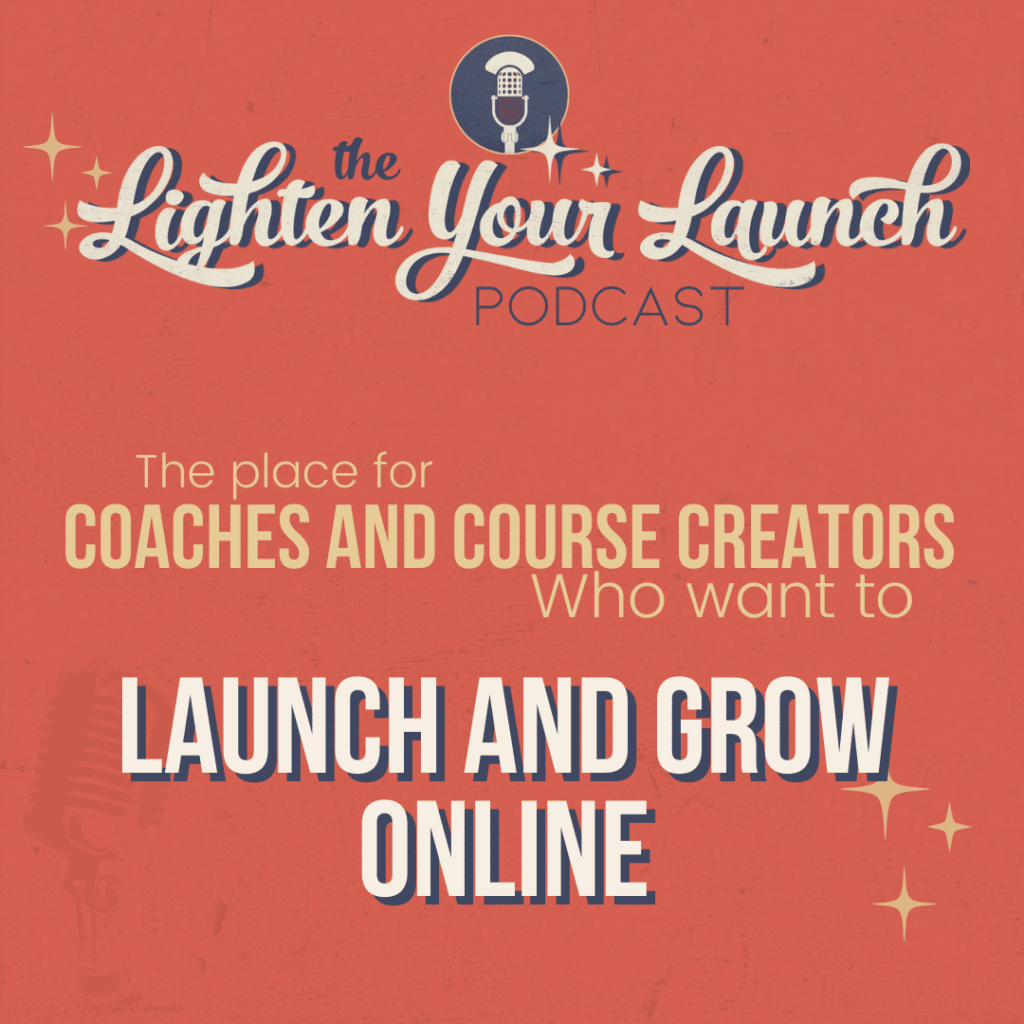
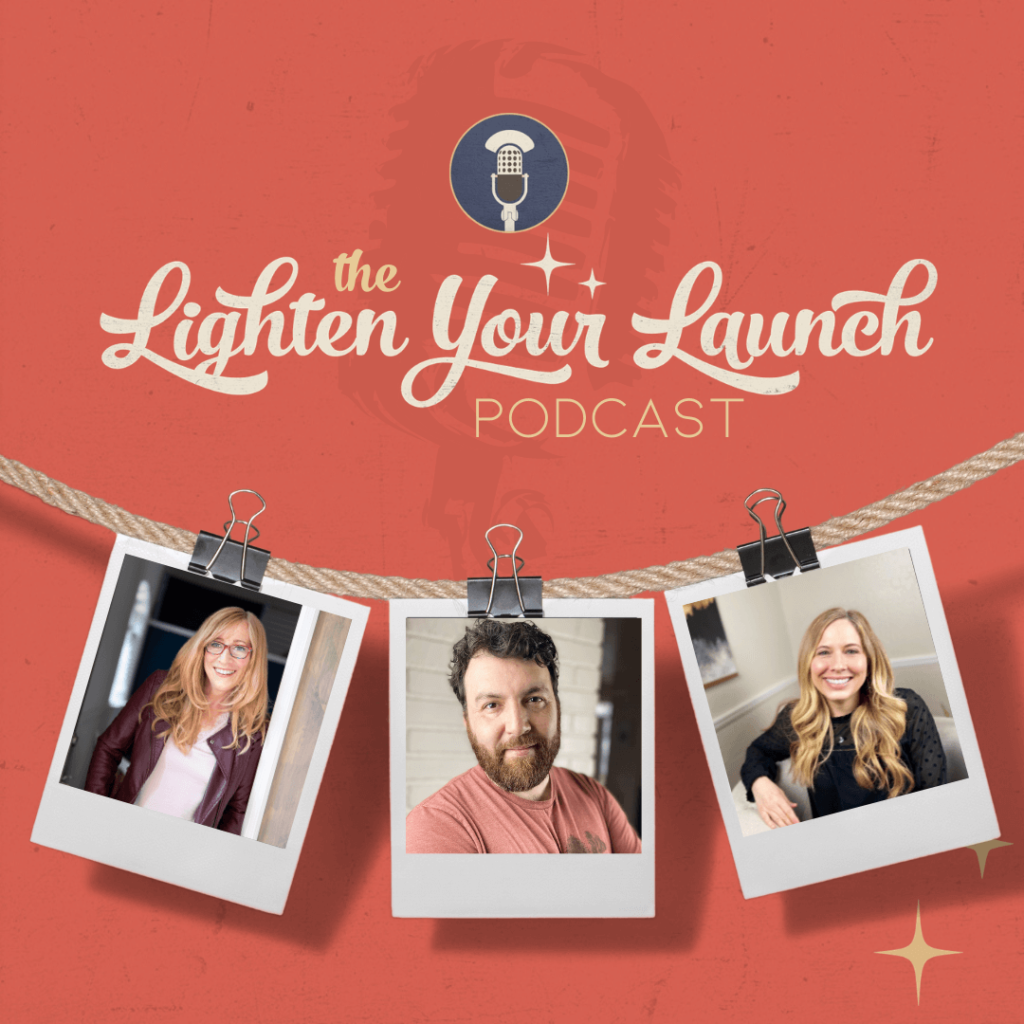


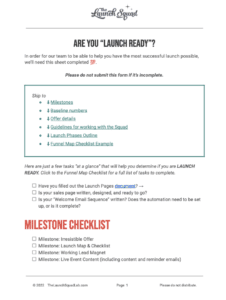
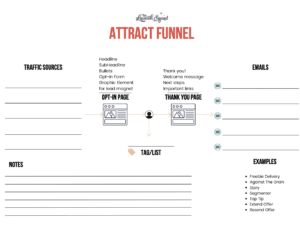
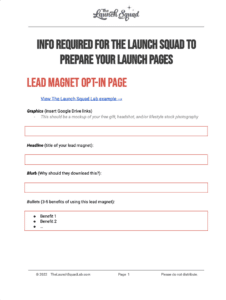

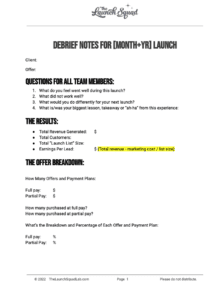
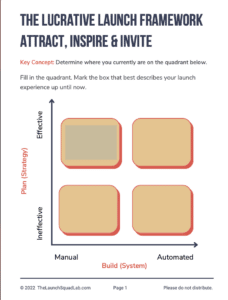
![Marketing Launch Calendar [TEMPLATE]](https://thelaunchsquadlab.com/wp-content/uploads/2023/05/Marketing-Launch-Calendar-TEMPLATE-300x260.png)
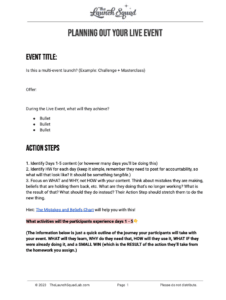


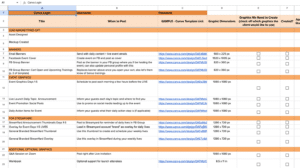
![[Updated] Email Templates for Launch](https://thelaunchsquadlab.com/wp-content/uploads/2023/05/Updated-Email-Templates-for-Launch-223x300.png)
![[REVISED] LS Pitch Script](https://thelaunchsquadlab.com/wp-content/uploads/2023/05/REVISED-LS-Pitch-Script-2023-226x300.png)

